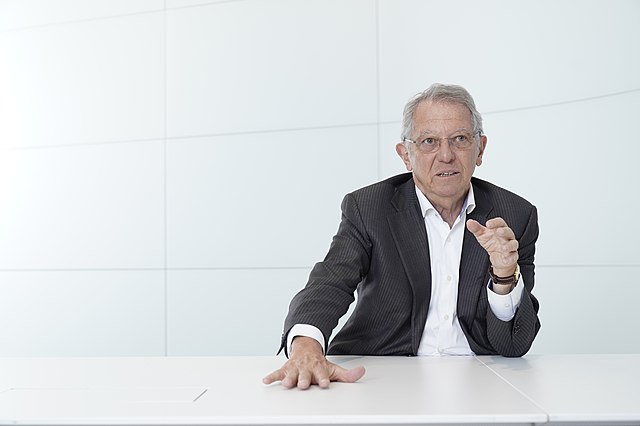In a master class at VU Amsterdam, climate expert Sir David King proposed two innovative solutions for climate repair: artificial whale poo and cloud machines.
“Because he is such an amazing speaker, we decided to make this master class open to everyone.” With these words, climate expert Sir David King was introduced by Ivar Maas, coordinator of the honours course Climate repair. Ten honours students are accompanied by some forty attendees this Thursday March 18. King (83) vividly talks about his life, climate change and the little hope there still is.
“It was difficult but it was the best decision I ever made”, King says about deciding to quite science and enter politics. As the scientific advisor to UK prime minister Tony Blair, he was able to put the importance of climate repair on the map. Despite his efforts, the current state of our climate is quite depressing, as he explains in the first hour of his lecture.
Arctic troubles
King talks about how the average temperature on Earth has risen 1.3 degrees Celsius, which is still below the much-feared 1.5 degrees Celsius. “However, you have to look at it regionally. At some points, we have passed tipping points already. For instance, the average temperature rise on the North Pole is 3 degrees.” According to King, this causes the ice that covers the arctic to melt far more quickly than expected. “Because ice reflects the heat of the sun and seawater absorbs heat, we’re basically cooked. This makes it really difficult to repair climate change.”
At times it is hard to focus on what King is saying as laughter, music and shouting fills the room. The noise comes from study association EOS, where students are having drinks at their home base right next to the lecture hall. It seems to symbolize how humanity is dealing with climate change: ordinary life goes on despite the great threat posed by global warming.
‘Because there are too many greenhouse gases in our atmosphere, we also need to remove them’
Reduce, remove, refreeze
After a rather depressing hour, King starts talking about strategies to reverse climate change. According to him, we need to do three things: reduce, remove and refreeze. “We really have to reduce our emissions. But this has got to be done in an orderly fashion, you can’t just say to countries like China and India that they have to stop with fossil fuels now. That would cause a lot of despair to their citizens. So we need a strategy for every part of the world.” Sadly, reducing our emissions isn’t enough. “Because there are already too many greenhouse gases in our atmosphere, we also need to remove them.” The third part of King’s strategy is to refreeze the North Pole regions and ice on land, such as on Greenland. This can buy time for the reducing and the removing parts of the plan.
Whale poo
One of the ideas to remove carbon dioxide from the air may sound a little crazy at first: artificial whale poo. But after King’s explanation, it seems rather genius. Whales are a vital part of the oceans’ ecosystem, with their poo being fertile material for phytoplankton. These algae convert carbon dioxide into oxygen, similar to what plants and trees do. Also, phytoplankton is important food for fish larvae and krill, which in their turn are food for larger animals such as whales. By spreading artificial whale poo across the oceans, scientists aim to increase the amount of CO2-absorbing plankton and the number of sea animals. King hopes to prove this technology in four years.
Cloud machines
Another intriguing idea is to create clouds in the Arctic region to block out the summer sun and reduce the temperature. “Machines floating in the ocean make tiny droplets of seawater, which rise with the warm air. The water evaporates, leaving a cloud of tiny salt crystals. On those salt crystals, water eventually condenses again, forming clouds.” King hopes to have the first machines ready early 2026. “It may seem like that takes too damn long, but we have to make sure there are no side effects.”
